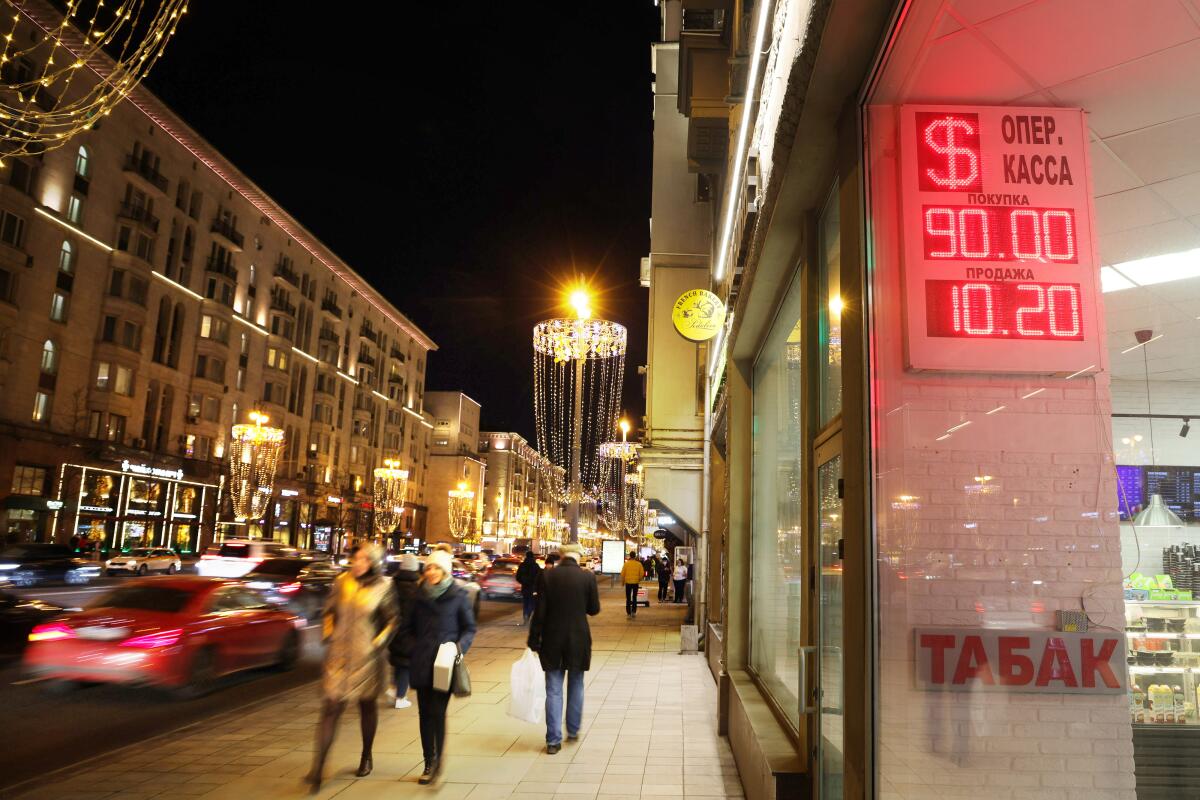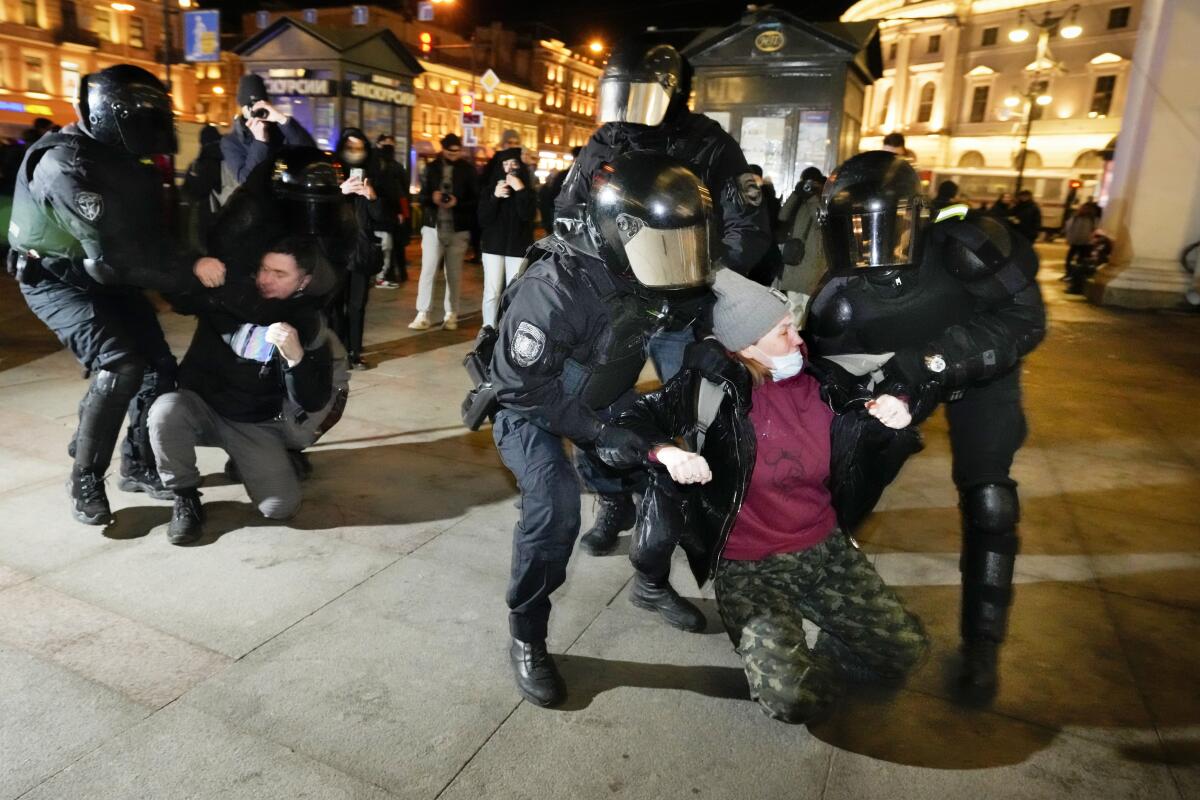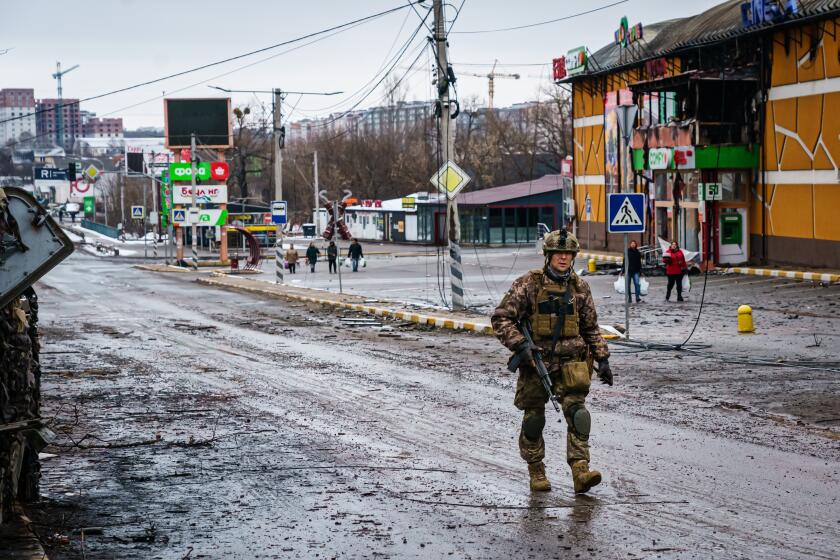Mood darkens in Moscow as Putin presses Ukraine war, but West still largely blamed

- Share via
MOSCOW — For some Russians, the fighting in Ukraine is a distant distraction. But for millions of others, the war next door is already touching many aspects of daily life.
While no meaningful comparison can be drawn between the desperate wartime reality that Ukrainians now face and the reverberations being felt in Russia, the country’s abrupt transformation into an international pariah has already wrought changes that might have seemed unimaginable even a week ago.
The Russian ruble has tumbled to record lows. Long lines form at banks and ATMs. Aspirations to live, study or work abroad are suddenly imperiled. Stock trading has been suspended. International flights are almost impossible to come by. Retail clerks are rushing to replace price tags on imported goods. Parents of military-age sons are shaken and scared.
Millions of Russians with friends and relatives in Ukraine are heartsick, while others cling to the belief that Russian President Vladimir Putin is doing only what is necessary to protect the motherland against a perfidious West. Many people had accepted months of Kremlin assurances that there were no plans to attack Ukraine.
“I didn’t believe until the very end that a war was possible in the 21st century,” said Maria Zherdeva, a 23-year-old research assistant who lives in Moscow. “I just couldn’t take in that that was the new reality — that we’d talk about the beginning of a war while having drinks at a bar.”
The sea change that has taken place since hostilities erupted last week can perhaps most readily be seen in Russia’s cosmopolitan capital, Moscow, a city utterly transformed since the dour, cabbage-scented days of the Soviet Union, which collapsed in 1991.
In recent decades, Western-style trappings such as smartphones, posh shopping malls and easy, inexpensive travel outside Russia have come to be largely taken for granted, at least among a substantial middle class. But those lifestyle changes are now under threat, and that realization is growing daily.
Putin’s government has gone to enormous lengths to conceal the scope and ferocity — not to mention strategic stumbles — of its ongoing large-scale invasion of Ukraine, which was in its sixth day Tuesday.
In the narrative put forth by Russian state-run media, it’s not a war, it’s a special military operation. And it’s not an unprovoked attack on a neighbor; it is a necessary measure of defense against an aggressive, predatory North Atlantic Treaty Organization and the United States.
No mention is made of fierce Ukrainian resistance to a Russian military presence that Putin maintains is a natural consequence of two “brotherly” countries being one and inseparable.
“I think that so far, it’s been possible for the Kremlin to keep a very considerable degree of control over the media space, partly due to independent media outlets being closed or under tough pressure,” said Nikolai Petrov, a senior research fellow at the British think tank Chatham House. “Look how it’s presented — there is a kind of silence.”
He and other analysts point out that even among Russians who have misgivings about this war, there is widespread acceptance of Putin’s insistence that the conflict was whipped up by the West.
But access to social media, even if curtailed, is giving many Russians, particularly younger ones, an unvarnished glimpse of what is taking place in Ukraine. Word-of-mouth accounts are spreading among the families of young Russian conscripts. People talk by phone and via messaging apps with loved ones in Ukraine, hearing harrowing tales of hardship under Russian bombardment of major cities.
And many Russians are experiencing the direct effects of the Western sanctions. That can be something as simple as suddenly being unable to use Apple Pay or Google Pay in the Moscow metro, which resulted in passenger traffic jams at some stations on Tuesday.

At least in some circles, there is a notable darkening of the mood.
“I see a rise in anxiety,” said Elena Lebedeva, a 57-year-old Moscow psychiatrist. “Patients call me and they cry. They are afraid and anxious.”
Lebedeva can understand that anxiety better than most. She has lived in the Russian capital for four decades since coming to the city for her medical studies, but she’s originally from the Ukrainian city of Lutsk and has relatives who are currently spending nights huddled in air-raid shelters.
“I still have very close friends and classmates in western Ukraine,” she said. “My parents’ graves are there. I’m very upset, as I don’t know when I will be able to go there again.”
The reality of isolation from the wider world is also setting in.
The European Union has closed its airspace to Russia, banning all Russian aircraft from taking off, landing or overflying EU territory. The U.S. imposed a similar ban Tuesday. Russia is all but cut off from the international banking system. Multiple Russian financial institutions have been blocked from Visa and MasterCard networks.
Russia’s multi-pronged assault on Ukraine stretched into a seventh day even as Moscow said it was ready for more talks after a fruitless first round. Russian forces capture the port city of Kherson in the south.
With many sports and artistic institutions curtailing or severing Russian ties, even the realm of popular culture is not immune. On Tuesday, Paramount Pictures announced it would suspend the theatrical release in Russia of the forthcoming films “The Lost City” and “Sonic the Hedgehog 2.” Disney, Sony and Warner Bros. had made similar announcements regarding the pausing of their own releases, citing the Ukraine crisis.
Some financial effects of the sanctions will take time to be felt, but others have dealt more of a sudden shock. With its reserves for the most part frozen, Russia’s central bank more than doubled its key interest rate to 20%. The ruble’s loss of about a quarter of its value means life savings and pensions in rubles overnight can buy far less in dollar terms.
Nearly a quarter of the country’s population is younger than 18, and a generation of Russians has no firsthand recollection of Soviet days when travel abroad was almost impossible for ordinary people. Now many fear those days have returned.
“I feel totally insecure about my future,” said Zherdeva, the research assistant. “I cannot continue with my life; I keep thinking that I urgently need to leave the country. This realization that I need an urgent escape from here is scary.”
As a result of the attack on Ukraine, a small but determined antiwar protest movement emerged. The rights group OVD-Info, which monitors arrests, has reported about 6,500 detentions in more than a dozen Russian cities since the invasion began.
In Moscow, there is a heavy security presence at sites such as the Ukrainian Embassy, where bouquets piled up in the initial days of fighting, and a monument to the famed Romantic poet Alexander Pushkin, a traditional gathering place for protest events.
This war appears less popular than the 2014 seizure of Ukraine’s Crimean peninsula — which was denounced outside Russia, but well received domestically — but even so, many analysts say the Russian leader still has a firm grip on the levers of state power.
Moreover, the outcome is still unknown. Concession by Ukraine to even some of Putin’s demands could be painted as victory, even if Russian forces were unable to carry out the swift decapitation-style strike that Western intelligence agencies believe Putin’s generals hoped for.
Still, parents of conscription-age young men are increasingly aware of the reality that their sons may be caught up in the carnage. Ukraine’s ambassador to the United Nations this week read out poignant text messages from a soldier who was killed, telling his mother that he hadn’t even known he was going to war.
That prospect “worries me sick,” said Tamara Panich, a 45-year-old Moscow homemaker who is the mother of an 18-year-old son. For now, he has a university deferment, but she fears it might not last.
“I am a pacifist and believe that the army should be only professional, for people who sign a contract, who choose a military career and like such work,” she said.
In previous bloody wars such as the ones in Afghanistan and Chechnya, bereaved military families made it hard for successive Soviet and Russian governments to conceal the fighting’s true toll.
Petrov, the Chatham House researcher, cited a grim workaround being used by the military to erase a prime symbol of individual and collective battlefield losses.
“They don’t really send them home in body bags now,” he said. “They cremate them.”
Special correspondent Korobtsova reported from Moscow and Times staff writer King from Washington.
More to Read
Sign up for Essential California
The most important California stories and recommendations in your inbox every morning.
You may occasionally receive promotional content from the Los Angeles Times.











